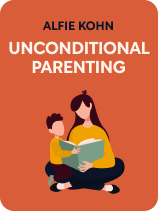

This article is an excerpt from the Shortform book guide to "Unconditional Parenting" by Alfie Kohn. Shortform has the world's best summaries and analyses of books you should be reading.
Like this article? Sign up for a free trial here .
What does it mean to be a supportive parent? Why is it important to be supportive? How does being a supportive parent benefit children?
According to author Alfie Kohn, today’s parenting advice focuses almost exclusively on a punishment-and-reward system of discipline. Not enough attention is paid to learning how to be a supportive parent outside of disciplining kids.
Keep reading for Kohn’s advice on being a supportive parent and why it’s so important.
Why Being a Supportive Parent Is Important
How can we raise kids to be self-confident, independent, and compassionate? In Unconditional Parenting, author and lecturer Alfie Kohn argues that we should throw away the standard parenting rulebook and replace it with a new approach built on being a supportive parent who shows unconditional acceptance and understanding.
Kohn doesn’t discuss the science behind this readjustment of priorities, but it’s becoming increasingly clear that kids’ brains benefit from a close, supportive relationship with their caregivers, that caregivers who focus on long-term goals behave in a more nurturing way and are better at explaining their reasoning, and that children who see discipline as fair are more likely to comply. And one interesting joint problem-solving method—though Kohn likely wouldn’t endorse this approach—is asking kids to come up with their own punishments. Kids are often surprisingly fair in determining punishments, and may even go too far, turning into barbaric “little Stalins.”
While Kohn’s methods are similar to those of other gentle parenting advocates, his emphasis on unconditional love over behavior change strategies sets him apart from most others. This underlying attitude of unconditional support does seem to be important. For example, research shows that both negative and positive “parental conditional regard” have negative effects on children, especially in terms of how they learn to cope with difficult emotions. The opposite of conditional regard—autonomy support—has positive effects.
How Being a Supportive Parent Benefits Kids
To replace ineffective and damaging conditional parenting tactics, Kohn proposes being a supportive parent through unconditional parenting techniques. This means making it absolutely clear to your child that your love doesn’t depend on their compliance.
Unconditional parenting:
1. Prioritizes the relationship over the behavior. Kohn argues that people who use rewards and punishments treat the parent-child relationship as transactional. But while transactional relationships are common for adults, they’re not appropriate within families. Being a supportive parent means that parental love and affection shouldn’t have to be earned.
2. Prioritizes long-term goals over short-term ones. Conditional parenting techniques might make a child comply right now, but they don’t help her to develop empathy, autonomy, and healthy self-esteem in the long run.
3. Prioritizes the child’s developmental needs over the adult’s convenience. Let’s be honest—parents often demand that a child do something because it makes the parent’s life easier, not because they have his best interests at heart. Being a supportive parent means putting the child first. To do this, you’ll need to be patient, flexible, and scrupulously honest about your motivations.
4. Sees the child as an active, rather than a passive, participant. Kohn recommends “working with” children rather than “doing to” them, which means seeing difficult behavior as a problem to be solved together, rather than as a trigger for criticism or punishment.

———End of Preview———
Like what you just read? Read the rest of the world's best book summary and analysis of Alfie Kohn's "Unconditional Parenting" at Shortform .
Here's what you'll find in our full Unconditional Parenting summary :
- How to raise kids to be self-confident, independent, and compassionate
- Why you should throw away the standard parenting rulebook
- Why rewards and punishments cause more harm than good






